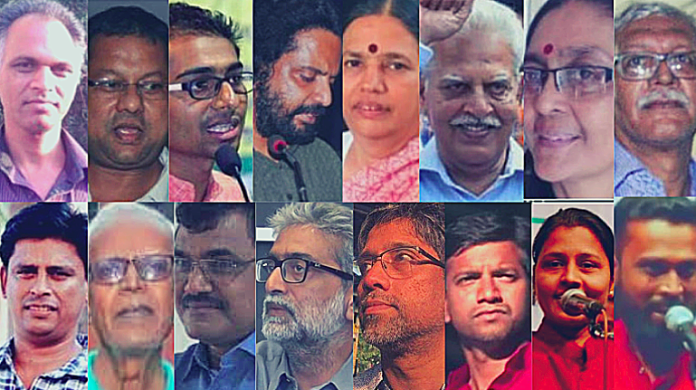– Mohd Naushad Khan
The Bhima Koregaon case is a complex legal and political matter in India, stemming from the violence that occurred on January 1, 2018, during the bicentenary celebration of the Battle of Bhima Koregaon in Maharashtra. This event holds significant historical importance, particularly for Dalits, who commemorate the British East India Company’s defeat of the Peshwa forces as a symbol of resistance against caste oppression.
Arrests and Legal Proceedings
Sixteen individuals were arrested on allegations of Maoist links and inciting riots: Jyoti Raghoba Jagtap, Sagar Tatyaram Gorkhe, Ramesh Murlidhar Gaichor, Sudhir Dhawale, Surendra Gadling, Mahesh Raut, Shoma Sen, Rona Wilson, Arun Ferreira, Sudha Bharadwaj, Varavara Rao, Vernon Gonsalves, Anand Teltumbde, Gautam Navlakha, Hany Babu, and Father Stan Swamy. On August 29, 2018, five eminent citizens – Romila Thapar, Devaki Jain, Prabhat Patnaik, Satish Deshpande, and Maja Dharuwala – submitted a joint petition to the Supreme Court, challenging these arbitrary arrests.
Use of UAPA and Allegations
The accused were charged under the Unlawful Activities (Prevention) Act (UAPA), a stringent anti-terror law. They were alleged to have links with the banned Communist Party of India (Maoist) and accused of plotting to overthrow the government.
This case has sparked considerable debate and controversy, with critics arguing that the arrests are politically motivated attempts to stifle dissent and target activists working for marginalized communities. Allegations of evidence tampering and police misconduct have further marred the case.
Human Rights and Legal Concerns
Charges of Sedition and Terrorism: The use of UAPA to charge the accused with sedition and terrorism has raised concerns about the suppression of dissent and potential human rights violations.
Prolonged Detention: Many accused have faced extended detention without trial. For instance, Sudha Bharadwaj was granted bail only after spending over three years in custody.
Allegations of Evidence Tampering: Claims of planted evidence, including incriminating letters allegedly placed on the computers of the accused by external actors, have cast doubts on the investigation’s integrity.
Health and Human Rights Issues: The health of some detainees, particularly the elderly like Varavara Rao, has deteriorated in custody, raising concerns about prisoner treatment and detention conditions.
Voices of Criticism and Advocacy
Senior Supreme Court lawyer Sanjay Hegde stated, “The Bhima Koregaon case demonstrates that policemen in India have the power to indefinitely lock up anyone they consider a troublemaker. The invocation of UAPA against respected activists and academics has made bail extraordinarily difficult while the trial is indefinitely prolonged. It is a travesty of justice and human rights that should have no place in a democracy.”
Human rights activist John Dayal added, “If ever there was an instance of a regime seeing an assassination conspiracy in a two-century-old Dalit celebration, it must be the Bhima Koregaon case. The government has arrested the cream of India’s civil society, jailing its conscience. The alleged conspiracy plan, recovered from the laptop of one of the arrested, was an obvious hack job by the intelligence community.”
National and International Attention
The case has garnered significant attention from human rights organizations, activists, and international observers, who have expressed concern over the treatment of the accused and the broader implications for civil liberties in India. Of the 16 arrested, seven have been granted bail.
The Bhima Koregaon case has ignited a national debate on several fronts:
Freedom of Expression and Dissent: Critics argue that the case exemplifies the broader trend of using anti-terror laws to stifle dissent and target government critics.
Judicial Delays and Justice: The prolonged detention without timely trials highlights systemic issues in India’s judicial process, particularly in high-profile cases involving national security laws.
Human Rights: The case has brought international scrutiny to India’s human rights record, especially regarding the treatment of political prisoners and the use of stringent laws to curb civil liberties.
The Bhima Koregaon case remains a focal point for discussions on justice, human rights, and the rule of law in India. As legal proceedings continue, the case serves as a litmus test for India’s commitment to democratic principles, including the protection of civil liberties and human rights. The outcome will likely have significant ramifications for the country’s legal and political landscape.




